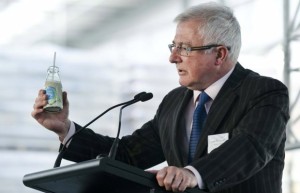
You down with TPP?
- Guest Post
- 10
- Posted on

You won’t believe how the NZ Government will sign your rights away with this one simple trade agreement.
By Consumer NZ’s TPP expert Hadyn Green
A few years ago the internet went black in response to the reform of New Zealand’s copyright laws. Huge numbers of people anonymised their profile photos to protest the inclusion of a three-strikes disconnection penalty.
It was a poorly thought out law that was designed solely to appease overseas copyright holders… and now we could be getting it back thanks to the TPP.
It’s hard to get interested in trade negotiations. They are usually dull affairs filled with thick legal text regarding tariffs and local protectionism. This deal, like every recent trade deal with the US, also contains a huge chapter on IP (intellectual property) that is long and just as dull. But within the 60 pages of this chapter (the whole agreement apparently runs to well over 1000 pages) are a number of fishhooks.
As well as a bunch of stricter enforcement rules (as mentioned above) there are also a number of things that become illegal or more expensive.
In a list format here are the most concerning parts of the IP chapter. Note that there may be equally concerning things in the other chapters but those haven’t been made public or leaked.
- We could lose parallel importing, so all of those cheap imported goods from The Warehouse will disappear, not to mention the impact it could potentially have on TradeMe or all of those “daily deal” sites.
- We will no longer be allowed to get around “geoblocks” this means no more multi-zone DVD players, and no more services like Unblock-US or Slingshot’s Global Mode
- Not only will you not be allowed to get around TPMs (technological protection measures) like geoblocking, it may also become illegal. So you could be charged for trying to watch that DVD you bought in the UK.
- Copyright will be extended to life of the author plus 70 years. Remembering that copyright is ensuring that the artist (and their descendants) is able to make money from their creation, it was determined a while ago that the optimal copyright term is 14 years.
- Medicine will get more expensive. The IP chapter also covers patents and, in particular, pharmaceutical patents. The intention of most US proposals is to increase the length of the patents companies receive for new drugs, this means an increased time before cheap generic drugs reach the market.
- If medicine prices go up (or stay expensive for longer) then health insurance premiums will certainly increase. There are also proposals to patent surgical procedures, with the only exception being procedures you can perform with bare hands.
- Beyond the IP chapter there are proposals to allow foreign investors and companies to sue our government if they regulate a particular industry. For example Philip Morris moved its entire company to Hong Kong so that they could sue the Australian government over plain packaging of cigarettes.
The only good thing about this is that New Zealand is standing firm on these.
The New Zealand negotiators (hard working folk from MBIE and MFAT) have stood their ground on a number of contentious issues or given their conditional agreement to some good proposals (usually waiting on final wording). This is great and Trade Minister Tim Groser’s constant assurances that he won’t sign “a bad deal” mean that New Zealand is in a great position.

Unless of course Minister Groser changes his mind when he gets to the final meeting Singapore on the 7th of December.
At the end of the week the trade ministers from the TPP countries will meet to do the final horse-trading so that they can sign the deal. The US will flex its economic muscle and hope to break the other members. Will the lure of selling more milk make Minister Groser sell out our laws to the US?
Moreover it would cripple Pharmac, increase costs for consumers and generally only be a good deal for large companies like Fonterra. It’s clear that the copyright maximalists of American business have had their hands on the pen with this deal.
KEI Online sent two Freedom Of Information Act requests to discover who the US trade officials had been consulting with about the TPP. Unsurprisingly it’s a large number of companies with a vested interest in long term copyright (many of those contacted were former trade officials).
The TPP is a secret trade agreement that sells out New Zealand law to US companies (and tightens US law down even further for the benefit of the same companies). Consumers in all TPP countries will be worse off, whether they are buying movies or medicine.
I urge you to be active about this. Trade deals are boring things, but this is one we need everyone to be interested in.


Your teaser is potentially a little misleading. You say we won’t believe how the Government will sign our rights away, when there isn’t a concrete indication that they would sign them away at all yet. As Haydn Green notes, New Zealand has, so far, stood firm on those contentious issues.
Some better wording could have been to use the word ‘may’ rather than ‘will’ to better reflect the current state of affairs.
The teaser was intentionally written as clickbait, because despite this being a secret trade deal where a bunch of bad things could happen, the NZ media seem to be completely ignoring it (I don’t consider OpEds to be reporting on the issue).
Also we would be silly to assume that NZ’s stand will be unwavering in this negotiation. For example the US will likely get it’s extended copyright term. So there will certainly be NZ laws changes based on what US companies are lobbying for.
So, objectivity out the window then?
@ Gywnn
The Ruminator isn’t a news outlet and to expect posts to be soley analytical and objective is unrealistic. What Hadyn has done is set out some facts, take a stance on those facts and present an argument in relation to both his stance and facts. The sacred cow of objectivity is of no use if you are trying to advocate for a particular view of ongoing affairs. Hadyn is interested in raising awareness about the impacts of the TPP on ordinary New Zealanders – presenting a dry, objective (according to who?) piece wouldn’t serve the purpose of raising awareness would it?
Why is objectivity no use when the alternative, as it is used here in the teaser, is to mislead people into believing that the TPP is a done deal when it is clearly not. That the negotiations have dragged on from an original November 2011 deadline would tend to indicate that it’s a much tougher deal to nut out than anyone believed.
I’m all for people trying to argue a particular point of view, but the simple fact here is that the Government hasn’t agreed to sign away anything and, if our negotiating team and trade minister are to be believed, have indicated they have no intention of doing that.
So yes, raise awareness of the potential impacts, but be honest that they are, currently, just that. Implying that the Government will sign away our rights just simply isn’t truth and it’s not an objective assessment of the current state of play in the negotiations.
Unless I’m mistaken, none of us have a crystal ball capable of telling us the precise course of future events, so all we can honestly say is that “if the Government signs” or that the “Government may sign”, not that the “Government will sign”.
Further more, one does wonder what Consumer NZ would make of a company using the wording “will” for something that wasn’t entirely certain, instead of “may”.
Frankly, I don’t think it’s unfair to expect bloggers to be objective in their treatment of facts and neither does being objective have to be dry. The rest of Haydn’s article is a pretty objective piece and is quite clear that these are all potential impacts if they went through as is.
I don’t disagree with your rationale in reagrds to the use of “will” – my point was that a factual and dry headline wouldn’t have encouraged people (the target audience being those who are unaware or uninformed about the TPP) to read the opinion.
I still have an issue with the call for “objectivity” however as one mans objectivity is anothers ideological rhetoric.
I’m not 100% on this and may have just read inflammatory bollocks on lefty-rant sites but the thing that terrifies me is if Monsanto gets its greedy way with the TPP and starts enforcing it’s seed copyright scariness in NZ like they do in the US and eventually start suing NZers when they want to grow their own food.
And that situation with Monsanto is something that really could come to pass under the TPP. Our current government do not have a good track record regarding protecting the rights of our citizens, (remember the Warner Bros deal…) and it is entirely rational to predict that they will sign away many of our rights, all to aid our illustrious leader in his quest for another White House photo-op
You inflammatory lefty ranter you! (LOL)